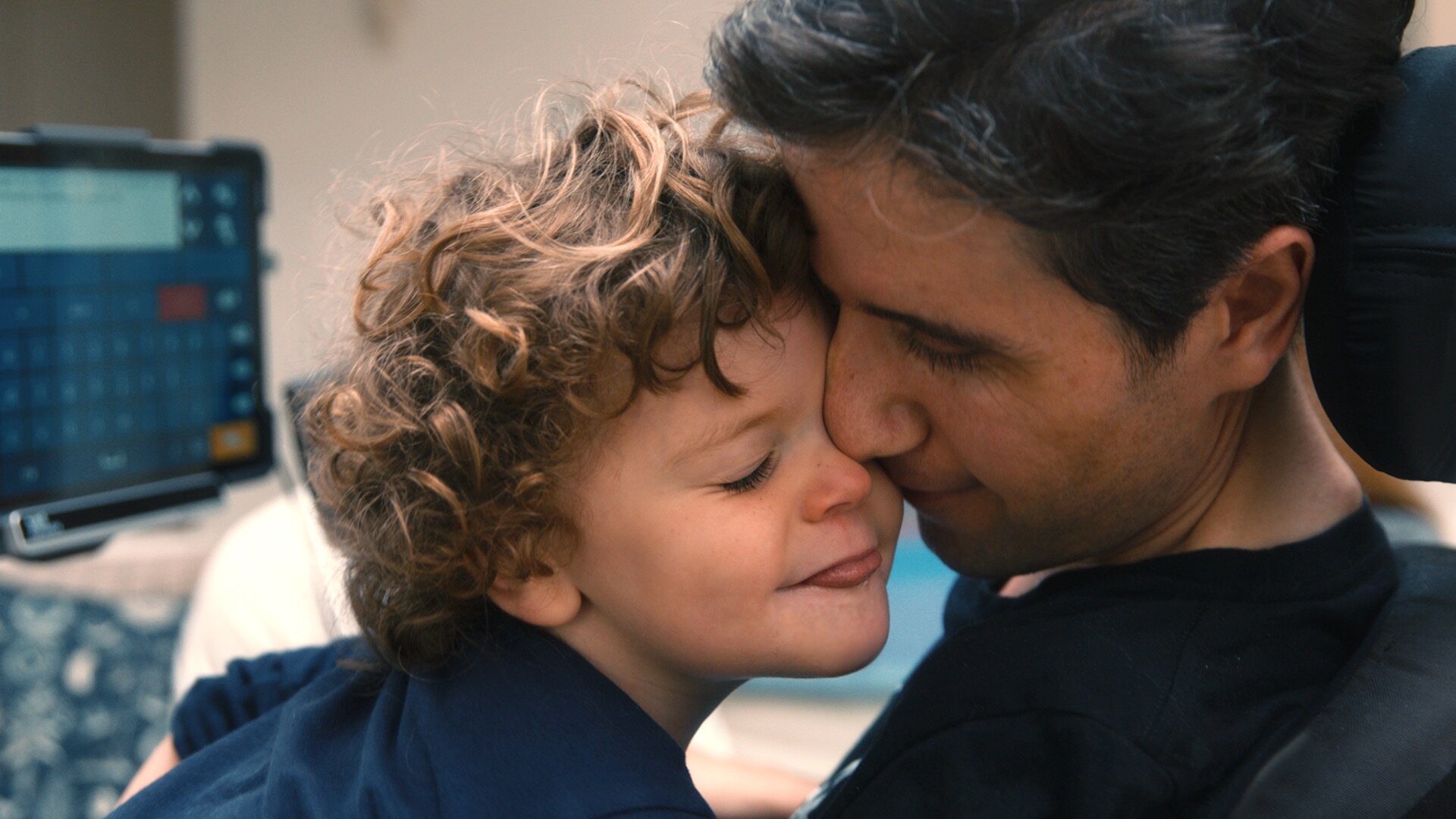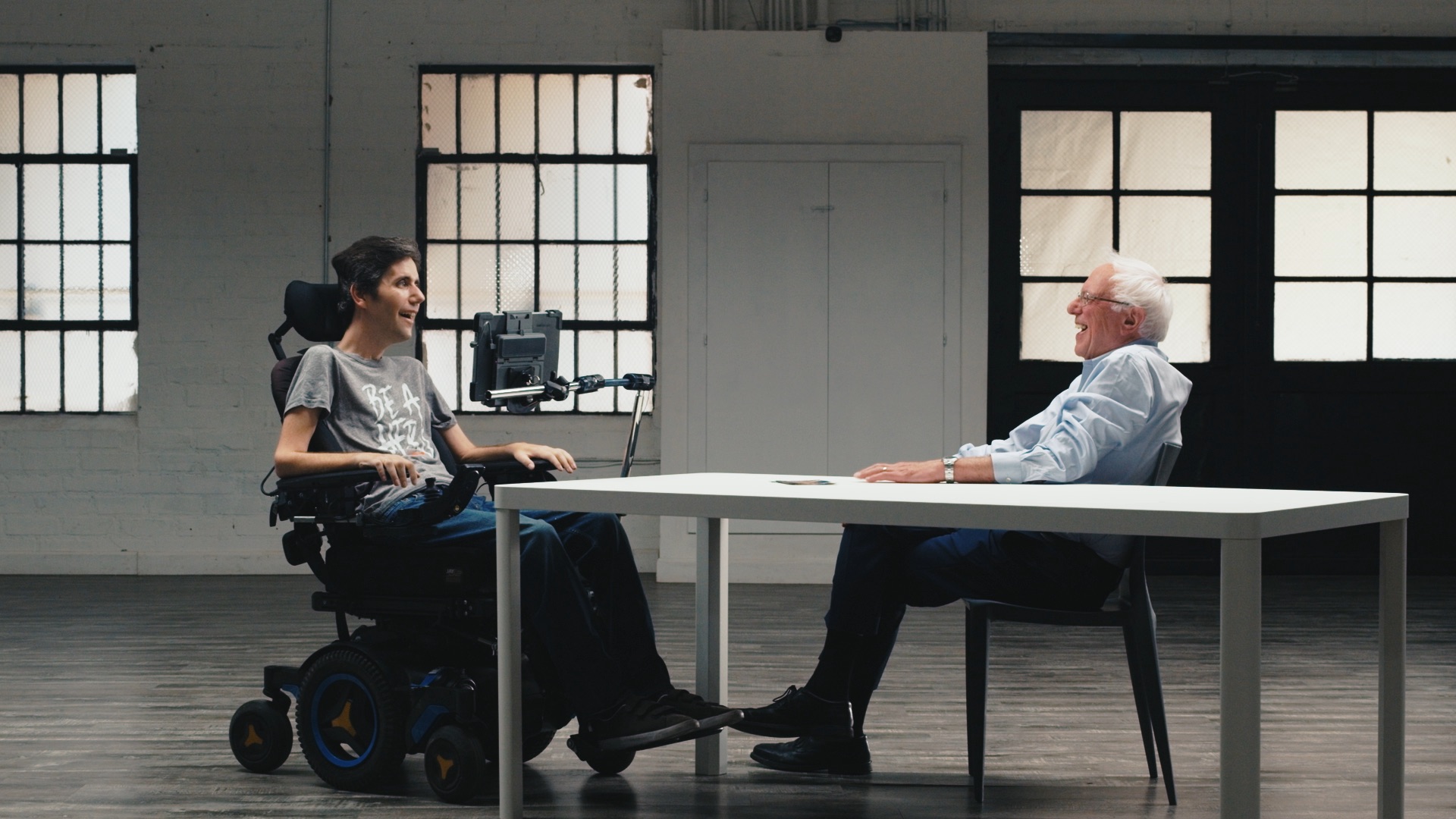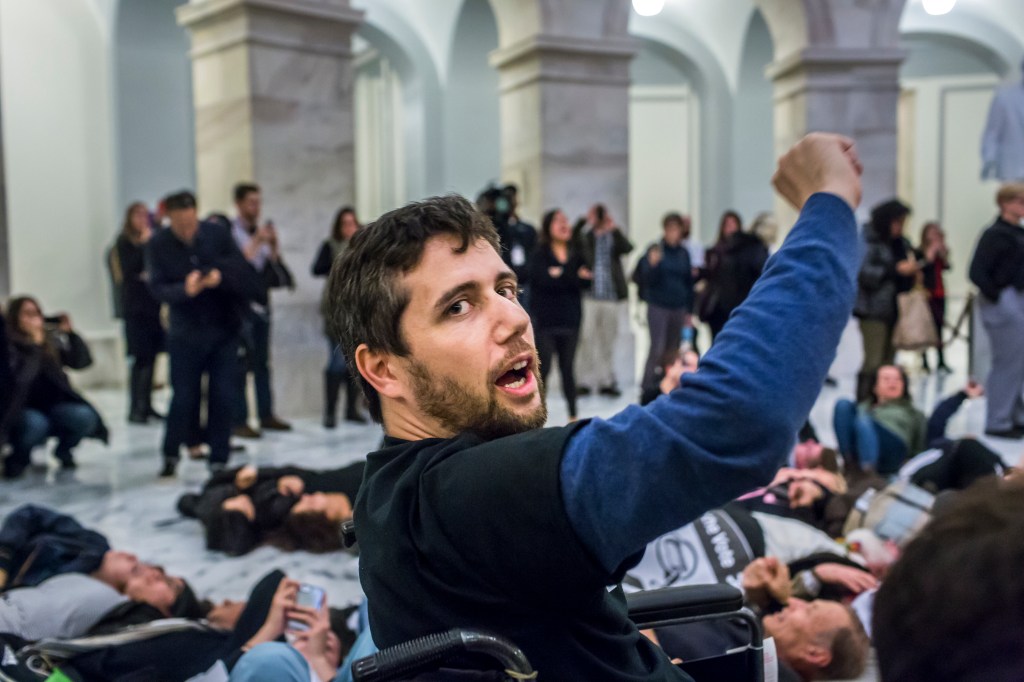In 2016, Ady Barkan was diagnosed with ALS, a rare neurodegenerative disease that attacks nerve cells in the spinal cord and brain. His doctors told him that with each passing day, he would lose more and more control of his motor functions until he could no longer move, eat, or speak. Eventually, they explained, he wouldn’t be able to breathe on his own. At 32, he was told he had three to four years to live.
It was difficult enough for Barkan to deal with his diagnosis, and to process what it would mean for him; his wife, Rachael King; and their newborn son, Carl. But his insurance company made coping with his illness even harder. They denied coverage of a breathing machine that Barkan needed to survive and refused to explain why, other than by describing it as “experimental.” Meanwhile, Republicans in Congress were pushing to pass a slate of tax cuts that would gut Medicare, dealing yet another blow to Barkan’s ability to access care.
Videos by VICE
Barkan, who had spent a decade working as a progressive activist and organizer, traveled to D.C. to protest the bill. On his way home, he happened to wind up on the same flight as former Arizona Senator Jeff Flake, a Republican who was seen as a potential swing vote at the time. On the plane, Barkan confronted Flake and urged him to vote against the tax cuts, pleading with him to “be an American hero” and help save Barkan’s life.
By the time Barkan arrived home in Santa Barbara, California, a video of the exchange filmed by a woman he’d met on the plane had gone viral. Barkan had a revelation: There was power in his story, one he could use in the fight for healthcare justice in America. He teamed up with the woman who had recorded his run-in with Flake, a longtime political strategist named Liz Jaff, to form a healthcare advocacy organization called Be a Hero.
In 2017, Jaff tapped filmmaker Nicholas Bruckman to fly to California and record a video announcing the launch of Be a Hero. Bruckman had come to shoot a 90-second spot—but as soon as he met Barkan, he decided his story demanded much more than that. He asked Barkan if he could make a documentary about his life and work, and Barkan agreed. Over the next several years, Bruckman and a team of filmmakers followed Barkan across the country as he campaigned to flip seats in Republican-controlled Congressional districts, protested Brett Kavanaugh’s nomination to the Supreme Court, and advocated for universal healthcare.
Bruckman’s documentary, Not Going Quietly—released earlier this year in partnership with VICE Studios, and executive produced by Jay and Mark Duplass—is a powerful testament to the idea that with enough determination, anyone can make a difference in our political system. But it’s also much more than that. The film is a tender exploration of hope and joy in the face of suffering; a portrait of a family conquering disaster, instead of letting it overpower them; and a demonstration of what true, deep care looks like, and the profound impact it can have.
VICE called up Bruckman, the film’s director, to talk about Not Going Quietly. He told us about the moving experience of witnessing Barkan and his family come to grips with his illness, how close he and Barkan became over the process of making the documentary, and the power of “fighting back in the face of hopelessness.”

VICE: How did you decide you wanted to make a documentary about Ady? Nicholas Bruckman: I flew out to Santa Barbara to meet Ady and shoot that 90-second launch video [for Be a Hero]. The first thing I ever shot with him is in the film: It’s when he’s topless, at the very beginning of the movie, and he’s got this big smile on his face, and he’s like, “Let’s get this show on the road.” That moment, where Ady is bare-chested, kind of laughing at himself, having both this incredible resilience and sense of resistance, both to the disease and the political moment—I just fell in love with him. I thought, This is somebody who’s going to change the world.
At the end of that first interview, I said, “Hey, Ady: Let’s record a Kickstarter video for a documentary. It’s going to be different from this campaign video I’m making. It’s going to be journalistic. I’m going to make it independently. It’s not an ad for you. It’s going to be warts and all of what you’re going to go through.” He was very receptive to doing that, right away. He had already been sick for a year when I met him, and he was already losing his voice. I think he felt this incredible sense of urgency to have his story told. I just knew I had to film right away. I had to get this guy saying everything that he would ever say before he lost his voice.
**Why do you think he was so quick to agree to do the documentary?
**Ady said in a recent Q&A that he looked deep into his heart, sat down with Rachael, and talked about what it would mean for him and his family to expose his story and his pain and share it with the world. He decided that what really matters, deep in his heart, is to be rich and famous. And this documentary might help.
Obviously that’s funny, but it’s funny because it’s multi-layered. He is this loudmouth, center-of-attention, brash activist dude. He’d been an organizer for racial and social justice, but he was always a relatively privileged, upper-middle-class, Jewish, Yale and Columbia-educated organizer. And then, when he became sick, there was this meaninglessness. It’s just the most senseless, crazy diagnosis out of fucking nowhere—“like lightning out of a clear blue sky,” is what he says. And suddenly, his privilege was taken away from him.
He became the voice of millions of people when he encountered Jeff Flake on that plane. And he was like, “Oh, shit—my story matters. It’s affecting people.” I think he knew that the film would be a way to further his cause.
The other thing, I think, is the family knew that this would be a time capsule of Ady for their kids. That was the personally motivating reason to let us in.

You were in the room during intimate, hugely important moments for Ady and his family—moments most people might not want to share with a cameraperson. How did you get them to agree to give you that level of access? Ady gets that the personal is political. He gets that there’s power in his pain, and that this disease causes people to listen to him. So that translated into Ady basically being like, “Alright, shower time—get the cameras in here!” The limitations around access were there, but they weren’t about privacy. They were about Ady’s voice.
A lot of the time, Ady only had like 30 minutes to talk in a day [before his voice would fail him]. Any documentary filmmaker wants to be like, “Alright, where are we? How are you feeling emotionally? Where are we going next?” And I really couldn’t do that. That would mean he’d run out of voice talking to his wife, or his son, or his audience, or the activists. And so I had to step back a lot and let him talk to others. The tradeoff was that he would let us in any room with him, anywhere. And I think it actually ended up making the film better, because instead of it being driven by interviews, it’s driven by his relationships with other people.
**This is such a moving documentary; I cried a handful of times while I was watching it. Were there any moments you shot that really hit you hard, emotionally?
**Ady got emotional while we were making it. And there were moments where I stopped filming and would go and give him a hug and talk to him. Those were hard and sad. But a lot of the moments were filled with immense joy and hope.
Being in that hearing room when Ady was testifying for Medicare for All—it was the first time Congress had ever had a hearing about the idea of universal health care in modern times. This ordinary person with no voice raised his voice, and it dissipated all of the jadedness and depression that I think everybody in our generation has felt since, like, George Bush got elected. And that’s what Ady does. He takes away your privilege to have cynicism, or to be jaded. It’s like: If this dude’s fucking fighting, what’s your excuse?
For as many heartbreaking moments as there are in Not Going Quietly, **there are also a lot of really, really funny ones. Ady has such a unique, almost wicked sense of humor. What were some of the scenes you had the most fun shooting?
**There was definitely a lot of camera-shaking, because I’m crying laughing. One fun thing about the movie—and I hope this comes across—was that it was like a buddy road comedy: These two BFFs [Barkan and Jaff] and this ragtag, motley crew of folks just doing all the stuff that happens on a road trip. The RV breaking down, the blackwater spilling, making s’mores.
A lot of my favorite jokes didn’t make the cut, and there were a lot [of them that were] even dirtier than the ones that are in there. Maybe I’m overanalyzing it, but I think Ady’s sense of humor is like an act of resistance to the disease. It’s basically him saying, “I’m not going to let ALS define me. I’m not going to let you pity me.” And it’s a parallel to like, “I’m not going to let Donald Trump and the Republicans define our government. We have the power to be seen and heard in the way that we want.” I think there’s this through-line between laughing in the face of this disease and fighting back in the face of hopelessness.
**Countless hours of footage didn’t make it into the documentary. Can you talk a little bit about why you cut what you did?
**Ady did so much shit that we filmed that was super newsworthy, but didn’t end up in the film. He raised like $4 million against Susan Collins by saying, “If you don’t vote against Kavanaugh, I’m going to raise money for your future opponent, who doesn’t exist yet.” Nobody had done that before. It was big national news. The other thing was when he met those presidential candidates. [Ed. note: In 2019, Barkan interviewed Democratic presidential hopefuls Kamala Harris, Elizabeth Warren, Bernie Sanders, Cory Booker, Julián Castro, and Pete Buttigieg about healthcare policy ahead of the primaries.] He was having these rapid-fire, crazy, emotional conversations using his eyeballs—confronting powerful politicians and putting them on the spot about their healthcare policies—and all that got cut from seven, hour-long conversations into a 45-second sequence in the film.
We had to be really careful in the edit not to chase the news, or the famous people, or the politicians, and really ground the film in Ady’s inner emotional journey. It was never about Donald Trump or an election. It was about Ady finding solace and purpose and meaning and connection with his family.

You didn’t interview any experts in Not Going Quietly or include any granular explanations of the policies Ady is fighting for. Can you talk about why you made that choice?I knew from the beginning that I never wanted to have any talking heads in the movie explaining healthcare, or Medicare for All, or insurance, or any of that. Tracey Corder, who trains activists on the road [in the film] and is an amazing organizer herself, says that a lot of people are afraid to be part of this kind of organizing because they don’t feel like they have enough expertise—they don’t know enough about health care. Her counter to that is that everybody is an expert on their lived experience. You know what your confrontations with the system have been and where it’s let you down or failed you. And that gives you the right to speak up and tell your story.
Ady, of course, is an expert, a policy guy. But I wanted all of the politics to be filtered through Ady’s experience. Seeing him get denied by his insurance company, seeing him get rejected at the doors of these congresspeople’s offices—that says everything you need to know about what’s broken about our system. What documentary does best is let you walk in somebody’s shoes and create this empathy engine. And that, I think, has much more power to galvanize and mobilize people than any informational [segment] in a film.
How did Ady react when he saw **Not Going Quietly? **I think he ultimately loved where it landed. He’s told me that he felt like we did him justice, which was a tall order. It’s something that he wouldn’t say to make somebody feel good; he would only say that if he meant it. He came out to our screening in Los Angeles, and it was fucking amazing. To see him roll into the room and the crowd all leap to their feet—for me, that was a very cathartic experience.
Ady’s story is far from over. How did you arrive at the decision to stop filming when you did, and when did you realize what your ending would be? For me, the arc of the story was about Ady’s loss of purpose and sense of his ability to be a great father—his fear that this disease had robbed him of who he was, and that he couldn’t really grow his family. Through organizing, Ady finds that meaning and finds that purpose, and ultimately realizes that maybe he can be a great father and he can grow his family. When Ady chose to have a child again, which was something that he’d always wanted, I think it showed that the disease hadn’t won. It was just this profound closing of the loop, this profound symbol of hope. We didn’t know that was going to happen, obviously. But from the moment we found out, I just had this feeling that that would be where our journey might conclude.
What do you want people to take away from Not Going Quietly**?
**For Ady, it was activism. But this movie could have been about somebody writing and performing their last great concerto. It’s about finding purpose and meaning in your life, and in difficult situations. I think we’re all looking for that.
A lot of people are like, “Oh, how’s Ady, how’s he doing?” And I’m like, “He’s fucking great. He wakes up every day with a reason to fight, for himself and for his family.” That’s what I want people to find in this movie.
_This interview has been edited and condensed for length and clarity.
Follow Drew Schwartz on Twitter._
More
From VICE
-

Photo: Rich Polk/Getty Images for iHeartRadio -

Photo: Johnny Nunez/BET/Getty Images for BET -

All photographs by Adam Rouhana -

(Photo via South_agency / Getty Images)
